Congratulations! You’re considering baptism for yourself or your child. Baptism is first and foremost a response to the Good News in Jesus Christ and calls us into deeper relationship with him as his followers. Baptism is not a moment but rather the beginning of a process of living the Christian life. Baptism is to be celebrated and Christ Church Cathedral will assist with that in whatever way possible.
What is Baptism?
Baptism is the universally Christian sign of belonging. (See “Baptism, Eucharist and Ministry,” World Council of Churches p. 01.)
Baptism is the sign of new life in Christ. Baptism unites Christ with his people. That union is both individual and corporate. Christians are, it is true, baptized one by one, but to be a Christian is to be part of a new creation which rises from the dark waters of Christ’s death into the dawn of his risen life. Christians are not just baptized individuals; they are a new humanity. (Book of Alternative Services p. 146)
Jesus himself instructed his disciples and the church to “19Go therefore and make disciples of all nations, baptizing them in the name of the Father and of the Son and of the Holy Spirit, 20and teaching them to obey everything that I have commanded you. And remember, I am with you always, to the end of the age.’” (Matthew 28)
Baptism is the way in which the church receives people into the family of God to live life in a new way and with new meaning. At the time of baptism, the person is formally made a member of the Church, and is called to make Communion in the other of the two Gospel sacraments, the Holy Eucharist.
… baptizing them in the name of the Father and of the Son and of the Holy Spirit, and teaching them …
When we are baptized we make a commitment to follow Jesus Christ. This means that we are willing to let go of our old ways of seeing ourselves and others. We make a conscious decision to respect ourselves and others, to grow in our ability to live in harmony with others, and to forgive when others hurt us. We believe that we have a responsibility to resist evil in our own lives and to work to transform our society into a caring family which is centered on Christ’s passionate love for the world. We also commit to care for and be good stewards of the gift of God’s good creation.
If we are bringing children to be baptized, we make a commitment to help them grow to understand God’s purpose for the world and to encourage them to participate in bringing about this purpose. As baptized individuals or parents of a child being baptized we also promise to support the work of our local congregation and diocese through our gifts of time, talents, and financial resources. We become members of the Church and God’s very own children.
What is infant baptism?
In the Anglican Church, children may be baptized, under special circumstances, with parents and sponsors making the commitments and vows on their behalf. The parents and sponsors and the parish community also commit on their own to bring these children up in the church to understand God’s purpose for the world. If parents are not ready to make baptismal promises or wish to defer baptism for a while, that’s a respectable and responsible decision. The church also offers a rite of “thanksgiving for the gift of a child” in which the family gives thanks for the birth and prays for God’s help in the child’s care and nurture.
What are sponsors?
Sponsors are baptized adult members of a Christian community. They are witnesses to the baptism and accept responsibility for supporting the person’s spiritual development – his or her growth in Christ. Both children and adults have sponsors. Traditionally, children have had three sponsors (sometimes called godparents) – two relatives or family friends of the child’s own gender, and one of the opposite gender. It is necessary for sponsors to be baptized themselves and preferably they are actively living the Christian life as disciples of Jesus in their own Christian community.
When does baptism take place?
Because baptism is the way a person becomes part of the church community, the witness and welcome of the congregation is an essential part of the sacrament. Members of the congregation commit themselves to support and care for the newly baptized persons and to help them grow in faith. According to diocesan liturgical directives, baptism is celebrated at five particularly special times of the church year: the second Sunday in January (The Baptism of the Lord), The Eve of Easter (or Easter Day), The Day of Pentecost, All Saints Day (Sunday on or after 01 November) and the visitation of the Bishop. (See Directive 2 Christian Initiation)
What is the catechumenate?
The “catechumenate” refers to a process, involving the whole congregation, in which new members are brought in, instructed and formed in baptismal identity for mission and ministry, and through which the life of the congregation is itself strengthened and renewed. The North American Association for the Catechumenate works to promote reflection on these processes, and offers resources and a gathering place for work on the catechumenate and baptismal ministry. Instruction for Confirmation is often recommended for adults who seek Baptism. Please discuss the possibilities with the Dean.
How do we prepare for baptism?
Candidates for baptism, their parents and sponsors, receive instruction in the meaning of baptism and of the vows they will make. A series of three sessions are scheduled before each Baptismal Festival. See the Cathedral Sunday bulletin for information about these dates.
If you wish to explore the possibility of baptism, please speak with the Dean of Fredericton. You’ll need to be in contact several months in advance. The Baptism Request Kit provides further information, including a “Baptism Request Form.” Speak with the Dean on a Sunday morning or visit the Baptism Request Kit page to download its components. The Dean will be pleased to receive your request and we will work with you in the process of preparation for the sacrament.
Go to the Baptism Request Kit page
Other resources:
The Ministry of all the Baptized – The Anglican Church of Canada
“Saying Yes to Being Christian” Herbert O’Driscoll
“Thinking About Baptism” John W.B. Hill







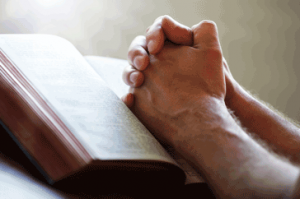
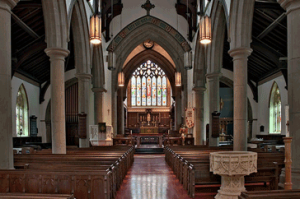
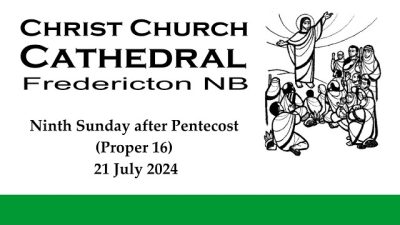

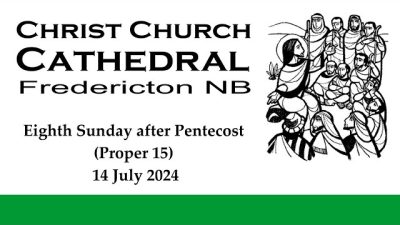
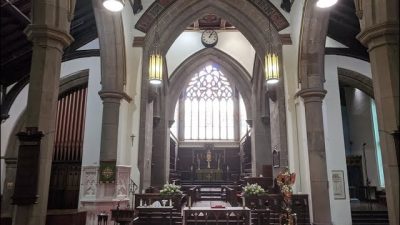






Recent Comments